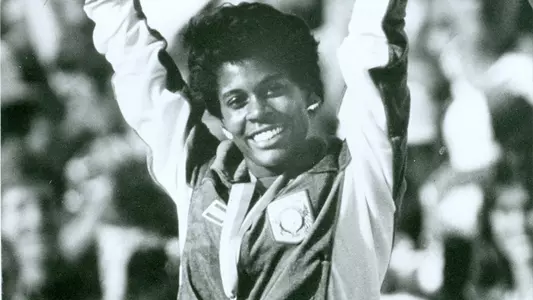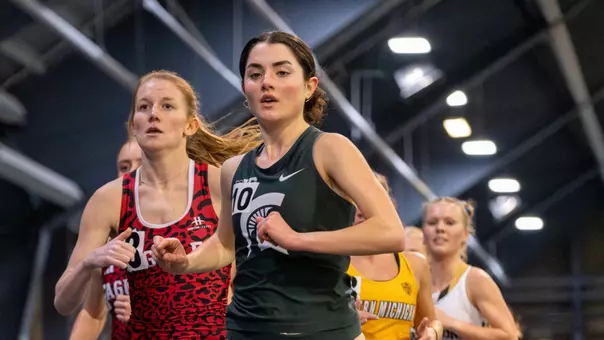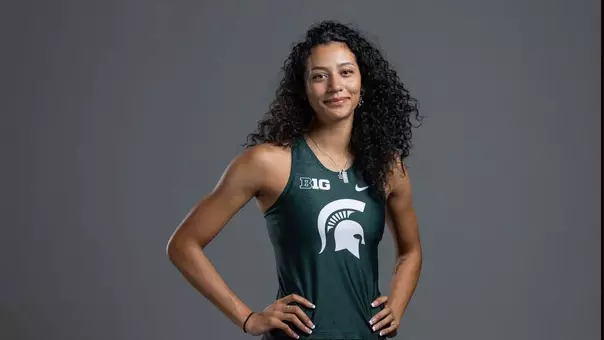Michigan State University Athletics

Judi Brown Clarke: Helping With Life's Hurdles
2/28/2008 12:00:00 AM | Track and Field
Feb. 26, 2008
Judi Brown (Clarke) has spent her entire life focused on the welfare of others. She has used her stature as one of the country's elite track stars along with an educated background to assist people in need. Whether it was dedicating her senior season at Michigan State to her cancer-stricken team trainer, using her silver-medal-winning Olympic fame to help care for abused children, or providing multicultural-related initiatives to enhance the diversity of MSU's campus, Brown used her experience of overcoming hurdles so others could do the same.
Prior to winning Olympic silver, Brown hurdled her way through Michigan State as a 12-time Big Ten champion, an NCAA champion, a three-time All-American and a world record holder. Perhaps most stunning is the fact that if it wasn't for her father's transfer from Indiana to the Lansing area, none of this success would have happened.
Believe it or not, track was never much of a passion for Brown. The sport was her third favorite at best when she was young, and colleges were more focused on pursuing her for her volleyball and basketball skills than they were for her efforts on the track.
Born and raised in Milwaukee, Wis., Brown and her family moved to Indiana following her time at elementary school. She would spend the next few years growing up in Indiana until her father, an electrical engineer for Oldsmobile, was transferred to Lansing when Brown was to be a senior in high school. At that time, she had excelled in volleyball and was receiving numerous recruiting letters from interested schools. But when it came time to move to Michigan, several colleges were unaware of her relocation and Brown fell off the recruiting radar. In fact, once she had made the move to Michigan, several people thought that Brown was just a junior, not a senior, in high school.
When she began looking into Michigan State in 1979, she was disappointed to find out that the Spartans did not have a volleyball program at that time. It wouldn't be until two years later that the Big Ten officially recognized women's athletics and sponsored conference championships. Michigan State did however have track and field at that time, and after competing in track in high school, Brown joined the Spartan squad. It was a decision that ultimately defined the rest of her life.
Following an All-American season in which she was a member of the world-record setting sprint medley relay team at the Mason-Dixon Games, Brown teamed up with Candy Burkett, Molly Brennan, and Jacqui Sedwick to win the 1982 Big Ten Indoor Championship in the 4 x 220-yard relay with a conference-record time of 1:41:26. She would return in the spring to claim the 440-meter hurdle league title in 59.77 and help the Spartans win the team championship, which marked the first in program history.
"We had the most incredible team that season because everyone had high standards and an incredible work ethic," Brown said. "Everyone cheered for each other, made sure everyone was eligible, and was carrying their own weight. We were really focused and just felt like it was ours to lose."
The team championship in 1982 was an unforgettable experience for Brown and the following season would prove to be even more memorable. But while Brown made significant gains in her athletic career, she also suffered a major loss as well.
Brown had befriended Tasha Bolton, an athletic trainer for the track team who was diagnosed with leukemia. The two would often have conversations at practice, during meals, and in private about Bolton's battle and Brown's athletic potential. They were conversations that meant a great deal to the Spartan track star.
"Tasha would often pull me aside and let me know the potential I had," Brown said. "Soon she became so ill that she could no longer travel with us, so I began dedicating my races to her. I kept saying, `Tasha, I'm going to win this one for you.'"
Brown's senior season turned out to be a fitting tribute to her good friend. At the 1983 Big Ten Championships, Brown dominated the competition by winning five of her 12 conference titles at the event. She would later be named the Big Ten Female Athlete of the Year for her efforts, but all the triumphs soon turned tragic as Bolton lost her battle with cancer prior to the NCAA Championships.
In true Brown fashion, she dedicated her NCAA trip to Tasha, and vowed to win one for her.
She did.
Brown posted the nation's top time in the 400-meter intermediate hurdles and captured the NCAA outdoor crown. Not only was the win a victory for a fallen friend, but it was also proof to Brown that one, she belonged at this level, and two, athletes from the Midwest can be among the nation's elite.
"I wanted to break the stigma out there that talent only comes out of the Southern schools and from out in California," she said. "I wanted to dispel that and prove that was not the case."
Brown admits that winning the NCAA title opened her eyes to the national track scene. She says that her success on the conference level felt "fairly inclusive and self-contained." By defeating competitors she had not run against that year, she said the victory at nationals exemplified her commitment to her training.
Brown continued to find success in track at the 1983 Pan-American Games where she captured gold in the 400-meter hurdles. Now open to international competition, Brown's eyes were set on the 1984 Olympic Games in Los Angeles. Strangely enough, it wasn't until she arrived at the Games that she understood what the Olympics were all about.
"I did not grow up in a family involved with athletics," she said. "With exception maybe of the 1976 Olympics with everything surrounding (gymnast) Nadia Comaneci, I had no idea what the Olympics were."
Michigan State's Judi Brown (Clarke) has been successful as a Spartan student-athlete, coach, and now as an educator.
How soon she found out. Brown claimed the silver medal in the 400-meter hurdles. She attributes her success to always finding ways to reach the next level.
"I am an incredible student of the sport," she said. "At every level I was competing at, I would look at the person above me and would say, `What do I need to do to get to that next level?' It wasn't that I was looking past the level I was at, but I was just wondering if I could make it to the next level. That was my progression."
Following the Olympics, Brown continued to compete internationally and took a salary position in Oregon with Nike. When reading the newspaper one day, Brown came across an advertisement looking for assistance at a nursery, which had been set up in a small room in the back of a local church. Having been a Big Sister at Michigan State, Brown felt compelled to lend a hand.
"I was training three times a day, but still had time on my hands," she said. "They were looking for someone to hire, but I told them I could only volunteer because of my time demands with Nike, my training and travel."
So Brown began to care for the area's underprivileged children and within a few years watched the nursery grow into a multi-million dollar organization. She takes pride in her off-the-track efforts, noting that often times athletes are judged solely for their contributions on the field, or track in her case, and people usually don't hear about the work they do away from the competition.
In 1987, Brown's work was noticed in a big way. Sports Illustrated featured her in its magazine as one of eight U.S. "Athletes Who Care." One year prior to the national honor, Brown was inducted into the Michigan State Hall of Fame and was recognized as the school's Female Athlete of the Decade.
But even with a number of significant honors and distinctions, Brown feels her work is nowhere close to finished. She says that some day when she is older, she will reflect on her honors and awards while sitting in her rocking chair, but now is not the time. There is still work that needs to be done.
"I feel like I have a short amount of time here on Earth and there are so many things I can be a part of," she said. "I'm always trying to work on the next thing. My passion is helping abused children and dysfunctional and displaced families."
Once Brown moved on from Nike, she returned to East Lansing in 1992 as head coach of the Spartan women's track and field team. She was also credited for helping put together the MSU MVP Fund for minorities, which assists in breaking down both academic and financial barriers in a multicultural setting with hopes of providing post-secondary education opportunities.
Brown served as the Spartans' mentor until January of 1996, and then remained on campus to complete her master's degree in education. In 2000, she accepted the position of Policy/Program/Contract Administrator for the Michigan Department of Human Services and managed to obtain her doctorate in public policy and administration from Western Michigan during that time. She stayed in that role until January 2007, when she was recruited back to campus as the Director of Multicultural Affairs and Inclusion at MSU.
It is a role in which she serves with great pride and compassion. She often deals with students she refers to as "onion cases," meaning she is forced to remove several layers of the individual's life in an effort to learn more and be able to provide them with the best opportunities available.
It is a fitting role for Brown, who has now seen her life as a Spartan come full circle. As a young high school senior transfer who struggled to fit in, Brown became an icon in a sport that wasn't even in her top two, and then used her success to give back. Her journey has taken her from MSU to L.A., up the coast to Oregon, across the world, and back to campus.
It's been 20 years since Brown last tackled a hurdle on the track, but her efforts to ensure diversity and provide opportunities to underprivileged individuals at Michigan State remain obstacles she is focused on clearing.
"I take it very seriously," she said. "I hope some things I am doing inspire some people."
They are, and they have. It might just take that rocking chair to realize it.
Please visit the Big Ten's Black History Month web site for additional features.




